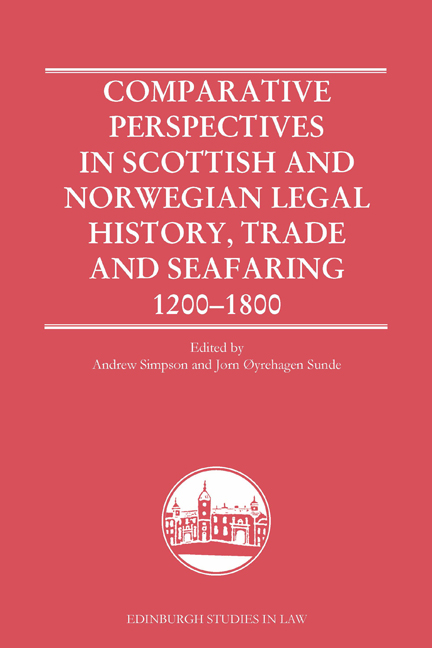8 - Traders and Immigrants: A Norwegian perspective on Scottish-Norwegian economic relations from the fifteenth to the early seventeenth century
Published online by Cambridge University Press: 17 November 2023
Summary
A: INTRODUCTION
By ca. 1600, trade between Scotland and Norway was extensive, and remained so throughout the seventeenth and into the eighteenth century. In particular, a great number of Scottish ships and merchants are known to have been calling regularly on harbours in rural areas of south-western and western Norway. With regular trade followed cultural influences, personal relations and migration, especially Scottish immigration to Norway. Drawing mostly on Norwegian primary sources and secondary literature, this chapter will outline the origins, early development, character, extent and impact of the Scottish-Norwegian trade relations up to the early 1600s.
In many respects, the resource geographies of Scotland and south-western and western Norway were quite similar. In this sense, Norway and Scotland were not an obvious match as partners in trade. The most important exception in our context, however, was access to timber. With growing demand and deforestation in coastal areas, Scotland increasingly needed to import timber. More than anything else, Scottish ships came in ever greater numbers to Norway for lumber in the sixteenth and early seventeenth century. What they could offer their Norwegian trade partners in return, though, was not solely based on Scottish natural resources but was also to a large extent based on Scotland being a more advanced mercantile economy with extensive international commercial connections.
B: SOURCES AND LITERATURE
It may come as a surprise how limited our knowledge is as regards Norwegian-Scottish economic relations. This is due partly to a rather fragmentary Norwegian source material prior to ca. 1600, both chronologically and geographically, and partly to a modest interest for the topic in modern academic research, with exceptions mostly of a limited geographical scope. From a Norwegian point of view, more attention has been paid to other aspects of the countries’ international trade in this epoch, particularly the trade with members of the Hanseatic League and the Dutch.
Late medieval sources in Norway mainly consist of individual charters – property deeds, royal ordinances and instructions, privileges for Norwegian towns and foreign merchants, diplomatic correspondence – and a few cadasters, mostly ecclesiastical. Extant sources bearing upon our topic pick up in the sixteeenth century, both in quantitative and qualitative terms.
- Type
- Chapter
- Information
- Comparative Perspectives in Scottish and Norwegian Legal History, Trade and Seafaring, 1200-1800 , pp. 232 - 271Publisher: Edinburgh University PressPrint publication year: 2023



